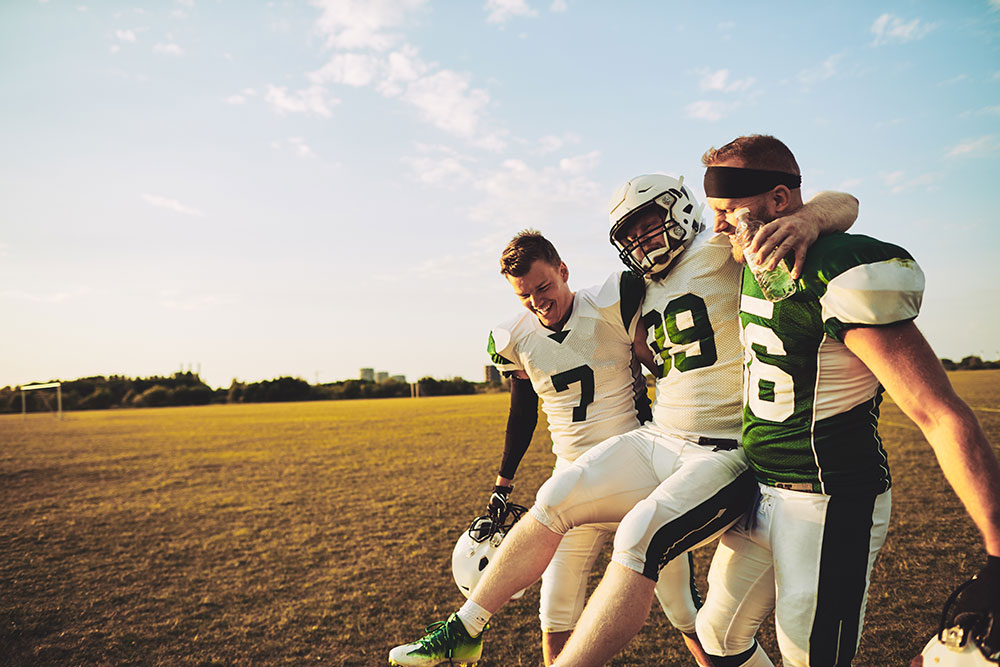
Richard Cunningham, MD is a board-certified orthopedic surgeon, and sports medicine specialist that cares for patients of all fitness levels and backgrounds. As an enthusiastic athlete himself, he understands the risks and concerns of having a sports injury. Nearly 2 million sports injuries occur in adults each year, and even more among youth athletes. Athletes often ask, “when should I see an orthopedic specialist after a sports injury?” Dr. Cunningham wants you to know what to look for after sustaining a sports injury, and when to seek medical care.
Sports Injury Types
There are three types of orthopedic sports injuries.
- Acute injury – Sudden injury that results in a fracture, tear, dislocation, or other orthopedic damage
- Overuse injury – Over time repetitive wear and tear can result in injury to the musculoskeletal system
- Illness or condition injury – Occur over time as a result of a medical disorder
Each injury type may require the care and expertise of an orthopedic specialist. In the case of an acute injury, it is typically recommended to seek immediate medical care. For other injury types, rest and home care involving pain management, elevation and compression of the injured area, and ice and/or heat therapy are typically the first treatment steps. However, the opinion of an orthopedic specialist is recommended given one or more of the following symptoms.
Swelling and decreased range of motion – Minor swelling with no other related symptoms can be treated with home care. If there is significant swelling combined with limited range of motion, bruising, pain, or deformity, there may be serious injury such as a fracture or ligament tear, and then this should be evaluated by an orthopedic specialist.
New sensations – Numbness, tingling, and weakness can indicate nerve damage. This should be worked up to determine if there is nerve compression or nerve injury.
Inability to bear weight – If you cannot bear weight on an injured joint then you should seek an orthopedic evaluation as you may have a fracture or a deep bone bruise.
Recurrent or persistent pain – Following trauma or overuse, if you find that pain persists despite a period of rest, it is best to seek medical attention.
Instability – If a joint feels unstable or gives way, you may have torn stabilizing ligaments. This should be evaluated by an orthopedic sports medicine specialist so that you do not do further damage.
An athlete should be aware if they develop any of the above mentioned symptoms. It is not advisable to ignore these symptoms and return to play or you risk causing further injury. Receiving the necessary orthopedic care right away will get athletes on the road to recovery and back in the game quickly. See Dr. Cunningham for all of your orthopedic sports injury questions and stay at the top of your game.
What are common acute sports injuries?
Athletes may experience acute sprains, strains and tears of tendons, ligaments, cartilage. Cuts, contusions, and scrapes are acute. Pinched nerves can occur suddenly and be debilitating to the athlete. Spinal issues, herniated disks, and sudden neck or back pain can also immediately impact athletic performance. Full rupture of joint ligaments or joint dislocations are urgent care issues.
Seeing an orthopedic specialist with an acute condition is a smart first step. Dr. Cunningham works with multiple athletes in many sports to diagnose and treat acute athletic injuries. Dr. Cunningham specializes in knee and shoulder injuries, and he is sought after by athletes for the treatment of ACL and meniscus tears in the knee, as well as shoulder dislocations and rotator cuff tears of the shoulder.
What are common overuse sports injuries?
For active people who concentrate one or two sports, there is an inherent risk of overuse injuries. Athletes may be diagnosed with bone conditions like stress fractures, shin splints and growth plate problems (in youth players). Tendons, muscles, and bursae of the joints can become inflamed causing tendonitis such as tennis elbow, jumper’s knee, or rotator cuff tendonitis. Patients can also develop fasciitis or bursitis. The spine and nerve system may be impacted by overuse resulting in degenerative spine conditions and nerve entrapment. Overuse can increase the risk of early arthritis in joints, leading to pain, stiffness, and swelling.
An orthopedic sports medicine specialist has the expertise to diagnose overuse injuries and set out a course of treatment to treat these effectively. With over 20 years of experience treating sports injuries, Dr. Cunningham is uniquely qualified to care for athletes confronted with overuse injury from a sport they love. A quick and safe return to play is the goal of his care. He has successfully treated many patients with both acute and overuse injuries and allow them to return to play.
Contact Dr. Cunningham with your orthopedic sports injury questions and concerns. In Vail, CO at (970) 476-2451, in Frisco at (970) 668-3633, and Edwards at (970) 569-3240.
